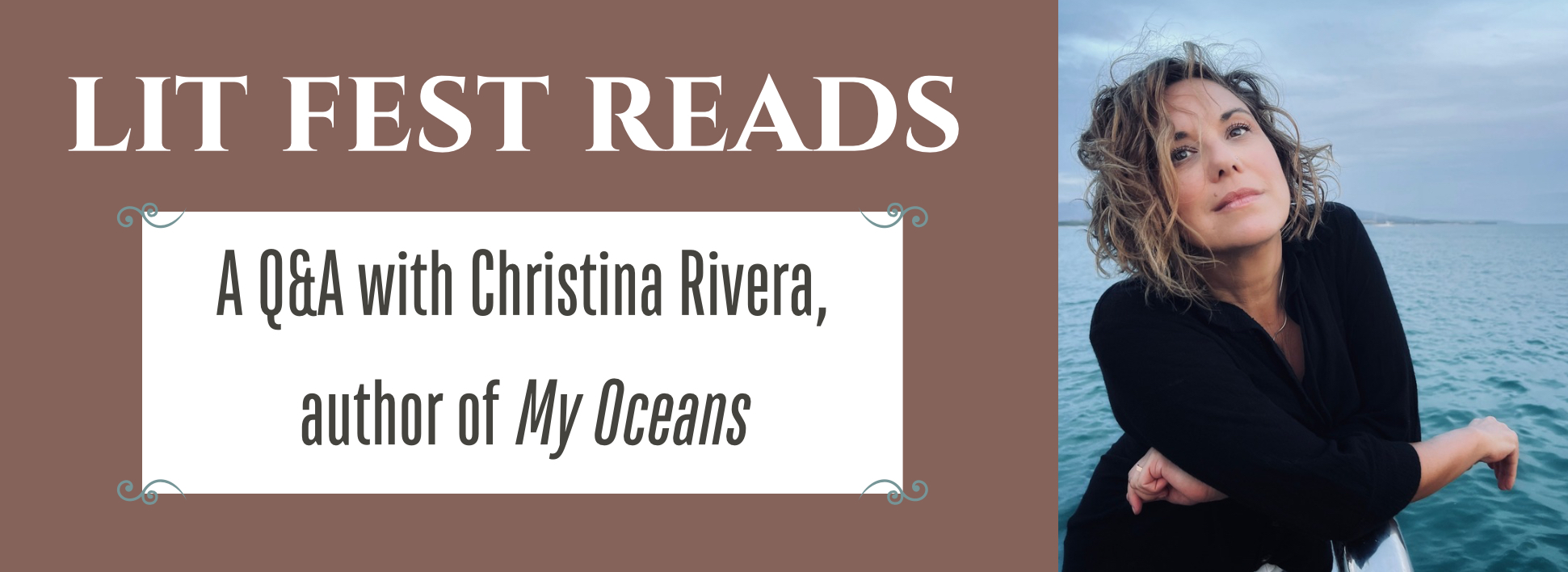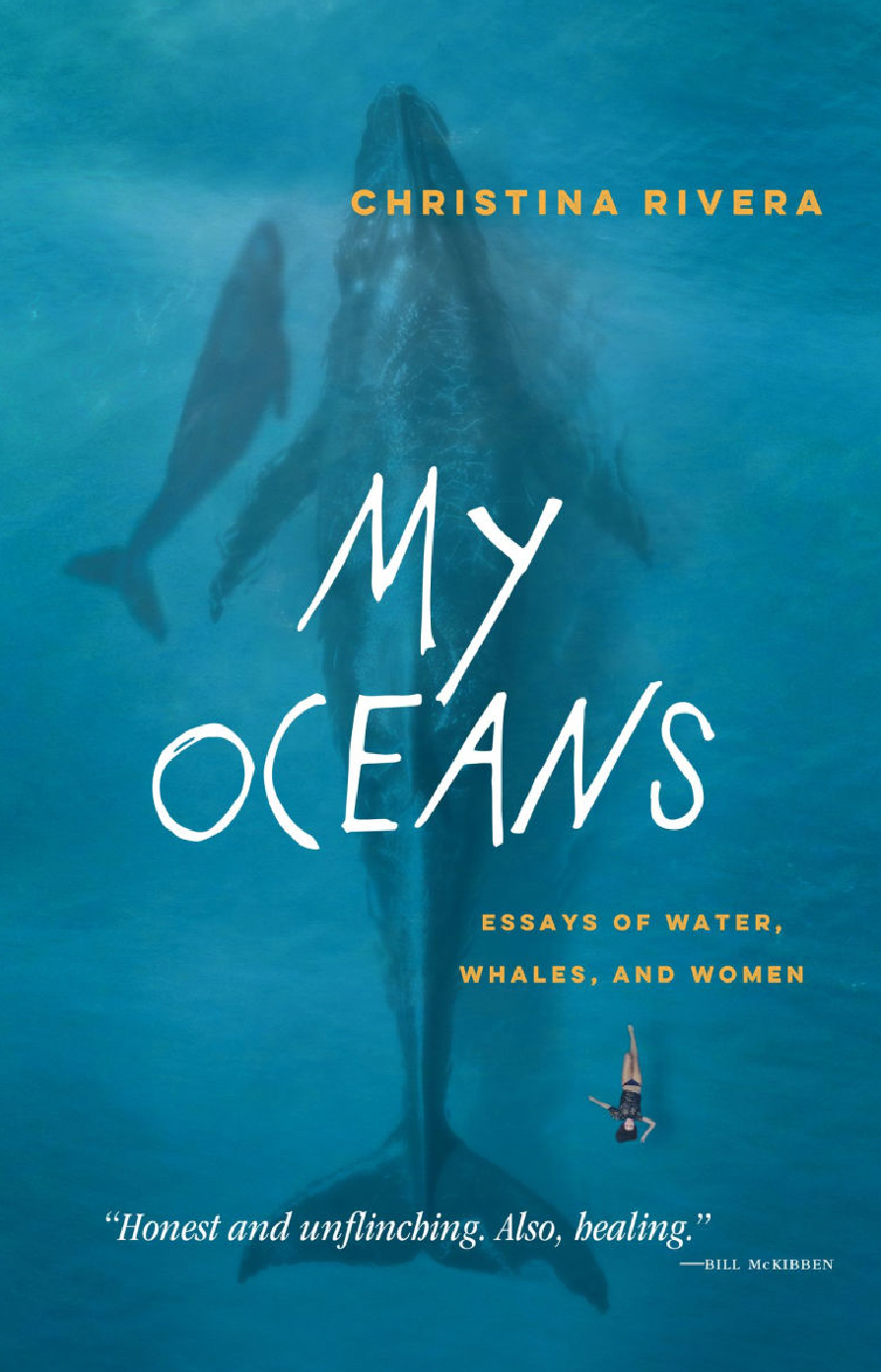
It’s time to dive into a new book, and we’ve got just the title for you! Christina Rivera’s MY OCEANS: Essays of Water, Whales, and Women is a series of linked essays that explore the Lit Fest alumna’s eco-grief and resonance with the “mother culture” seen in marine animals. My Oceans is described by her publishers as an urgent exploration of caring and mothering on a planet in crisis. Christina explores the kinship between marine animals, humans, and Earth’s blue womb as she redefines what it means to mother and defend a collective future.
Christina has attended Lighthouse workshops each year since Lit Fest 2016 and we are so proud to see her debut book in the hands of readers. We asked the author a few questions to reflect on her writing journey and passions that became My Oceans. Read her responses here:
Q: Tell me a bit about your experiences at Lit Fest. What was the most memorable moment or something impactful that you learned?
A: I attended four Lit Fests in a row. I loved the annual pilgrimage so much, I filled every year’s schedule from 8 am to the last panel and the last party on the last night. It often took me a week just to recover from all the extroverting of Lit Fest. But those weeks filled my journals with first drafts, filled my files with class notes, filled my phone with the numbers of new writing friends, and my literary soul with fire and grit and hope, and also my nightstand with a teetering TBR stack of books!
I think the most memorable workshop for me was a generative seminar with Melissa Febos. She tasked us with writing 1-2k words every night of the workshop. And I did it. But I didn’t know I could do that. I think each of those essays today is published or in My Oceans. We, as a cohort, planted some wild seeds in that crash course. But now I also know I can write 1,000 words in a single sitting. What I write might be sixteen drafts away from finished, but we all know how that first draft is the most important. Gaining that specific confidence—knowing I could put a thousand words onto a page in one night—was priceless. To be honest, I haven’t done that for a while. But knowing I can, feels like an ace in my back pocket.
Q: What do you think is the importance of intertwining stories of the natural, marine world with the world of women/motherhood? Or rather, what's the importance of sharing the fact that these worlds have always been inherently linked?
A: Motherhood was my portal to my animal-ness and to my marine-ness. The physical act of birth completely deconstructed the borders I held between myself and my environment. I was suddenly multiple people and yet also newly connected to every mothering body on the planet with an experience of caring for a split self. Womanhood, I would also argue, is a fragmented experience in this world right now. Feminism, to me, simply means respect for women. For their bodies, their choices, their consent, their freedom, lives, and dreams. Eco-feminism looks at the parallels between the systems trying to control women’s bodies and lives, and the same systems that exploit and extract from the environment without considerations of consent and care. In this book, I wanted to look closer at these threads of interconnection, not by just sharing climate facts, but by weaving science with personal, embodied, storytelling.
I also wanted the book—in shape—to mirror the content. I included this line in my author’s note on the first page of my book, “This is not an essay collection; not a gathering of things once scattered. This is a book of essays. Each piece born under the same moon. Fragments, yes. Because womanhood is fragmented, and motherhood is fragmented, and my understanding of my place in nature is as one of billions of faceted fragments. Motherhood is not a tidy or linear narrative. It’s punctuated. I wrote this book between naptimes and mealtimes and bedtimes. I also wrote this book in pieces because it was through my fragmentation that the distinctions between Earth’s oceans and my own receded.”
Q: Do you have a word of advice for writers, whether they're just getting started or in the process of publishing their work?
It can look deceivingly easy to see someone holding up a book and think, “They did it! They have a book! And, wow, look at that bio!” But I didn’t have a single “clip” for years. One year, I was rejected 100 times without a single acceptance. I’ve been rejected so many times, I’ve lost count and gone numb. That is the good news: it hurts less the more you get rejected. Wait, is that good news? Anyway, having some way of capturing my small wins (and re-messaging my losses as wins) was very helpful. I have a box where I keep paper records of these things and sometimes pin them on my wall as reminders. Seven years after I was rejected from Lidia Yuknavitch’s juried workshop in 2016, I published an essay that included one of those paragraphs I’d written in the back of her classroom while crying. I tagged her when I published the piece, and she READ the essay, and commented, “PHENOMENAL ESSAY. phenomenal you. x.o.x” You can bet that’s up on my wall! But it took seven years for that to come full circle. So patience, faith, persistence—and a degree of timely numbness—are all things I recommend!
Thank you so much, Christina. From her Q&A answers to her award-winning essays, Christina’s writing is breathtaking and absolutely worth a read. Add My Oceans to your shelf and buy it today!
Christina will also be speaking about and signing her new book with BK Loren, who she also met at Lit Fest, on April 10th at the Boulder Bookstore— don’t miss it!
Want to hear more about the process behind My Oceans and learn about publishing with Christina and her agent? Consider registering for our lunchtime business panel on June 10th at our annual Lit Fest event.

